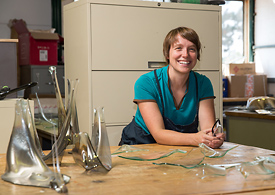Like Salvador Dali’s melting clock faces, Catie Newell’s glass creations slump against metal stakes. They are part of “Displace,” a research project with colleague Wes McGee.
She finds the fire-charred remains of a Detroit house ideal for a demonstrative endeavor involving ailing building materials. “Starting with a blank sheet of paper would not allow me to talk about arson. I wanted to create a new atmosphere out of something that’s otherwise known as a place and act of complete destruction,” she says.

Photo by Austin Thomason, Michigan Photography.
The assistant professor of architecture at the Taubman College of Architecture and Urban Planning this spring won the Cynthia Hazen Polsky and Leon Polsky Rome Prize for her submission “Involving Darkness.” It explores changes in building shapes and appearance, not from fire in this instance, but from the fall of darkness.
The Rome Prize provides a fellowship and stipend to cover expenses during her studies in Rome this academic year. Newell’s research will explore textures and effects of light on architectural spaces. The outcome will be a built installation work that explores distortions of the city’s dark landscapes.
She also is a founding principal of *Alibi Studio based in Detroit. Newell’s creative practice is recognized for exploring design construction and materiality tied to location and cultural conditions.
“I’m an instigator,” she says. “My works instigate conversation around particular issues — such as spatial and material abandonment, violence, destruction, and strain — that are pressing our contemporary cities. They aim to reveal, agitate and instigate.”
The West Bloomfield High School graduate attended Georgia Tech as an undergraduate. “I studied aerospace engineering and I was a pilot at the time. I thought I wanted to design helicopters,” she says. But she also studied art as well as engineering in high school, and wanted a creative outlet. “I think I’ve always been interested in different ways to capture or manipulate the world. Though lighting manipulation you can tell a story that everyone doesn’t see initially,” she says.
Still, Newell maintained her interest in engineering. “There was a necessary precision that I appreciated. It was a balance between those two ways of thinking.”
Newell, who earned a master’s degree in architecture from Rice University, joined the U-M faculty in 2009 as the Taubman College Oberdick Fellow. She says what’s most challenging and satisfying about teaching is helping students to identify their own special talents.
“It’s also understanding that there’s different ways of designing spaces and materials. I try to help students think about how to get their best ideas across, and how they can communicate visually and spatial about the issues that are important, and understanding their own ways of practice. When I can help a student get to their own effective way of working, that’s the most rewarding part of teaching,” she says.
The weekly Spotlight features faculty and staff members at the university. To nominate a candidate, please contact the Record staff at [email protected].

